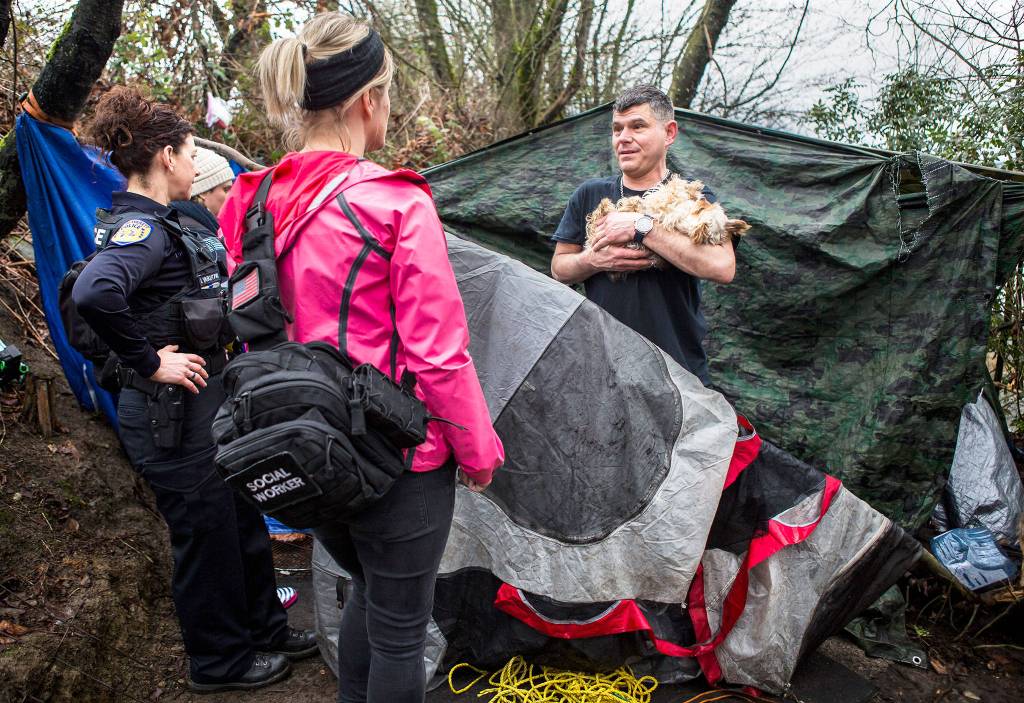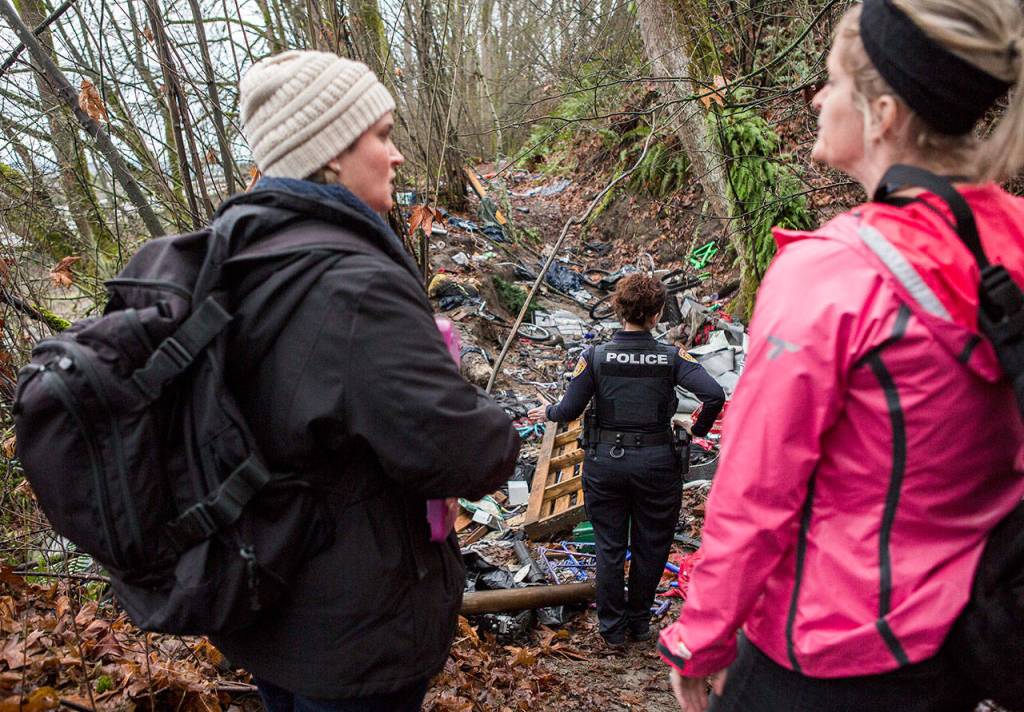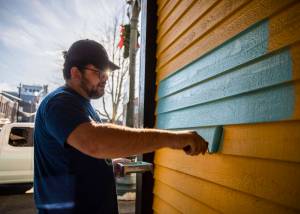Instead of arrest, new diversion program to offer resources
Published 1:30 am Tuesday, June 30, 2020



EVERETT — Local law and justice officials will use nearly $1.7 million in state funding to bring to Snohomish County a widely lauded program that aims to halt the cycle that keeps people circling from the streets to behind bars and back again.
The Snohomish County Prosecuting Attorney’s Office will work with police in Lynnwood and Everett in the coming months to start up the initiative, which will give police officers the discretion to refer someone who would otherwise be arrested to a caseworker who can connect them with housing, mental health treatment and other resources. The roughly $1.68 million grant, from the Washington State Health Care Authority, will also provide funding for those services.
The program is known as Law Enforcement Assisted Diversion, or LEAD. Developed in Seattle in 2011, it’s one of many efforts that partners law enforcement with social and health service providers to address deeper motivations for criminal behavior, reduce recidivism and save taxpayer dollars.
“By focusing on health and wellness and addressing the underlying root causes of why people are potentially engaging in criminal activity, this is a way to make the community safer,” county Prosecutor Adam Cornell said. “It’s not just to keep people out of jail. It’s to keep people out of the criminal justice system in the first place.”
LEAD’s arrival in Snohomish County coincides with a wave of protests — locally and nationwide — calling for an end to police brutality in the name of Black Americans who have died at the hands of law enforcement officers. Many are also calling on governments to “defund the police” and instead reallocate money to programs that promote community health and well-being.
On June 8, dozens of public defenders urged the Snohomish County Council to redistribute half of the county Sheriff’s Office budget into housing, counseling and other social services.
The LEAD program is one step to “address the very loud calls” that officials have long heard for criminal justice reform, Cornell said.
“I don’t think we should be talking about defunding the police,” he said. “There is a way to be smart about the money that we’re spending toward law enforcement that is actually going to make everybody safer. To me, it’s about precision policing. It’s about thoughtful policing. It’s about smart policing.”
Amid the civil unrest, County Executive Dave Somers recently unveiled a plan for a slate of racial and criminal justice reforms, including bail reform, a community police oversight board and body-worn cameras for law enforcement. Somers has said, though, that those initiatives will likely take years.
Officials expect that the LEAD program will primarily serve individuals who are homeless, have mental health issues, suffer from untreated drug addiction or have a combination of those attributes.
Everett and Lynnwood police both have embedded social workers, who work alongside officers to link homeless people to resources for problems such as substance abuse. But those staffers are so busy that they “don’t have the capacity” to maintain long-term relationships with those they are helping, said Everett Police Chief Dan Templeman.
“Effective law enforcement not only employs traditional criminal justice approaches but has to look outside of the box and be creative,” Templeman said. “LEAD is going to give us an opportunity to make a positive difference in our community and the lives of some of the most vulnerable in our community.”
Local law and justice leaders have long grappled with how to rehabilitate repeat offenders, who are expensive to imprison.
Between December 1, 2015 and May 31, 2019, about 28% of the roughly 8,200 people who Lynnwood police arrested were taken into custody more than once during that time period, according to the grant application the county submitted to the state Health Care Authority.
In a statement, Lynnwood Mayor Nicola Smith called LEAD “a critical step towards providing better alternatives to incarceration to those in our community suffering from substance abuse and mental health problems.”
“We know that we cannot arrest our way out of these issues that have impacts on all aspects of our community’s quality of life,” Smith said.
The exact eligibility requirements for the LEAD program have yet to be determined. Cornell said he intends to make the opportunity available to some people who face arrest for misdemeanors, low-level felony drug offenses and property crimes.
In order to avoid being booked into jail, someone who’s offered entry into the program must agree to engage with a caseworker and participate. Program staff may also reach out to other people on the streets to gauge their interest in LEAD.
Not everyone who is referred will be enrolled. The county has committed to referring a minimum of 200 people to the program and hopes to enroll at least 50 individuals.
The County Council on Monday unanimously approved a grant agreement with the state that requires that a program manager be hired within 30 days. Per the agreement, the county must also hire a clinical supervisor, outreach coordinator and case manager within 60 days.
Many details still need to be worked out, including the number of people who will staff the program.
Research has illustrated LEAD’s success in Seattle. Participants were 58 percent less likely to be arrested after enrolling compared to those who were arrested and prosecuted in the traditional manner, according to a 2017 study.
The prosecuting attorney’s office has other programs, such as drug and mental health courts, that give people charged with non-violent offenses the chance to commit to treatment instead of serving time.
The county’s 44-bed Diversion Center also offers homeless people with a substance use disorder and other behavioral health issues a place where they can stay temporarily, with the goal of steering them towards treatment. Last year, the center housed more than 600 individuals.
Still, people who struggle with addiction are crowding the jail.
The Snohomish County Jail’s medical housing unit was designed to hold two dozen inmates, but houses roughly 50 on average — the vast majority of whom are receiving care for heroin or opioid withdrawal, according to the county’s grant proposal.
A 2019 analysis found that, of the some 400 people booked into the jail one week, 29 percent were observed by staff for opioid withdrawal and one-fourth were watched for methamphetamine, the proposal says. At one point during the week, nearly 90 inmates needed a medical detox bed to safely sober up. There were only 35 available.
Rachel Riley: 425-339-3465; rriley@heraldnet.com. Twitter: @rachel_m_riley.







